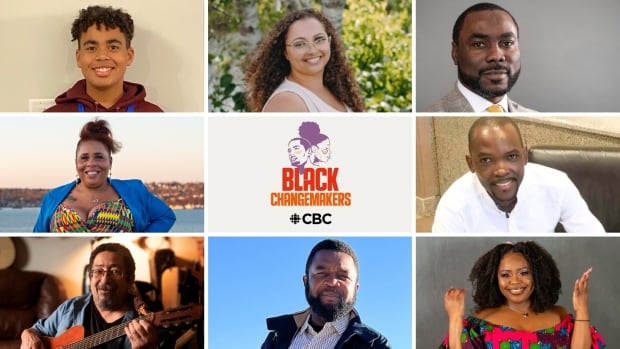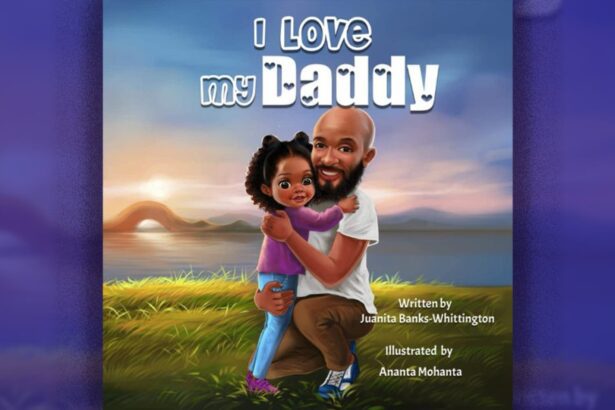CBC is highlighting Black people in Atlantic Canada who are giving back, inspiring others and helping to shape our future.
The public was invited to nominate people making meaningful contributions in their communities, and a selection committee comprising CBC staff and 2023 Black Changemakers set the list of people we’re celebrating for the 2024 series.
We will have more stories on each Changemaker in the coming months. Meet the 2024 CBC Black Changemakers.
Henry Luyombya
Henry Luyombya has always seen the power to change the world in people forced to the margins of society: young people, refugees, immigrants, queer people, or people using drugs or without homes.
“If we work together, social change can happen,” he says. “Change of mindset, change of heart-set, change of health-set, and change of soul-set.”
Luyombya works with PEERS Alliance as a clinical social worker on P.E.I. and his role is to help those people make that change, especially people from the 2SLGBTQIA+ community and their families. He also founded New African Canadians to bring mental health support and settlement services to people moving to the Island from Africa. In 2024, he will bring the Global Mental Well-Being and Substance (Mis)Use Conference back to the University of P.E.I.
The father of three grew up in Uganda. When he was 10, his father died of HIV-related illness, leaving his mother to raise the family. She faced stigma that drove her out of her job and into the HIV movement. Luyombya followed suit and made such an impact that at 23, he earned an audience with Nelson Mandela.
“He said, ‘Henry, I did not do this alone. I worked with courageous young men and women,'” Luyombya says. “That gave me hope, even when I left Uganda to come to Canada, to continue working with those on societal margins.”
Seth Borden

For Seth Borden, change comes through his passion to learn and teach. “My mom works in the school system, and I’ve always wanted to work with kids since I was in elementary school. When I was in Grade 5, I noticed I was in a predominately white school and I was one of the only students of colour that was African Nova Scotian,” he says.
Borden has been part of student councils and the Best Buddies Program, and he advises the minister of education — all while finishing Grade 12 at Citadel High School in Halifax. He works regularly with younger students, where his outgoing and kind personality provides a positive role model.
He wants to teach in an elementary school and help kids who learn differently or with difficulty. He is informed by his own experience with dyslexia, dysgraphia and ADHD.
He says his school IPP (individual program plan) gave him the time and tools he needed to succeed. But he also noticed the work tended to be “easier,” and wants teachers to understand that learning differently doesn’t need to mean learning less.
“When I do become a teacher, I’m going to make sure that it’s never going to be like that. It’s always going to be like the same stuff, just easier for them to understand.”
After graduating in June 2024, Borden will attend university, where he hopes to eventually earn a master’s degree in education.
Tia Upshaw

Tia Upshaw knows that change sometimes starts with uncomfortable conversations. “I crave change, so I will go against the grain if I feel like something is not right,” she says.
As a teenager, she was called defiant and told she asked too many questions. “Definitely. Now I’m in my early 40s. I realize it has actually benefited me and it has created needed change in community,” she says.
When she needed a change in her own life and couldn’t find a suitable job, she made one by starting a home-cleaning business in Nova Scotia. That income, plus a night job delivering newspapers, helped her raise her three children. But people told her the responsible path was education or government work — not entrepreneurship.
“Defiant” as ever, she persisted and now is the CEO of Blk Women in Excellence, a firm that helps other Black women start their own businesses.
“They do a 16-week startup program with us. They come in with an idea and leave being capital-ready, and that changes their whole household,” she says. “Their children are watching their mom doing that, which then entails that that child most likely will become an entrepreneur.”
She credits her grandmother Evelina with showing her the way by starting food banks and breakfast programs. Two of Upshaw’s three children have started their own businesses, showing the power of intergenerational growth.
“You have to be OK with not being liked, because those are the people who are changing the world.”
Scott Parsons

Others find deep change in the arts. “I’m a singer-songwriter,” says Charlottetown’s Scott Parsons. “For about the last 25 years, I’ve been writing and compiling a catalogue of songs of Prince Edward Island’s Black history.”
One of his key musical influences was the singer-songwriter Gene MacLellan, who lived on P.E.I. and wrote iconic songs such as Snowbird by Anne Murray. “Gene was a big influence on me and very encouraging,” he says.
Parsons plays guitar and sings, from blues to reggae, and for decades he’s played guitar for singer-songwriter Teresa Doyle.
Much of his career has been dedicated to social work, often with young people or people with disabilities. He played music through it all. His father “carried his guitar all through World War II,” he says, and encouraged his son to bring music to life. His mother told him if music made him happy, he should play.
No music made him happier than that about the Island’s long Black history. One of his first songs is called Jupiter Wise and it tells the story of Wise, a man enslaved on P.E.I. in the 1780s and his fight for freedom. In 2019, Parsons released the album Darkie’s Hollow, which included a song about Island boxer George Godfrey.
“I thought it was really important to write songs and collect stories from P.E.I.’s Black history because it had largely been forgotten.”
Adebayo Ogunleye

Adebayo Ogunleye worked in information technology for decades in Nigeria before making a big change by moving to New Brunswick in 2018. But he found Canadians tended to give him “the silent treatment” when it came to jobs, and he struggled to find work and accommodations.
“They prefer to hire someone with Canadian experience. Coming from Africa, that kind of puts us at a disadvantage. I had to break through that barrier just to stand a chance,” he says.
Today, he sits on the boards of the Nigerian-Canadian Association of New Brunswick and Cohesia, a Canadian group that promotes social cohesion, and he is a mentor at Opportunities New Brunswick.
He uses his personal time to help others make a smoother landing in New Brunswick. “We pick newcomers up from the airport when they arrive. We provide services helping them refine their CVs and provide a mock interview to prepare them for the job ahead,” he says.
He knows from his own life that too many negative experiences early on make it unlikely that people will stay in the province. By helping newcomers find work, or start their own businesses, and helping them find good housing, he knows he’s benefiting all New Brunswickers.
“I am so passionate about paying back and helping people become a better version of themselves because I believe everyone deserves a chance to prove themselves. It gives me joy.”
Jeffery Imhanzenobe

Jeffery Imhanzenobe also grew up in Nigeria, but for him change is rooted in his love of soccer. He played forward, and had no dreams of a professional career. Instead, he pursued computer engineering. In 2015, he moved to Canada to earn his master’s degree at Memorial University and found himself yearning for the beautiful game.
“As a strong believer of diversity, I decided to do something further by building the community through soccer,” he says. “In 2018, I became very active in organizing annual friendly matches between groups of countries here.”
He created Team Nigeria and helps host an annual inter-country competition, made up of hundreds of people from around the world who chose to live in the province. He says it’s like the World Cup for people who love soccer and Newfoundland and Labrador. Last year’s final was between Team Nigeria and Team Ghana.
Friendships are often made between “rival” teams and Imhanzenobe has seen many bonds bloom on the same team.
The married father of two also volunteers with an after-school soccer program for kids and serves on the Newfoundland and Labrador Soccer Association. He referees matches, too. What drives all of that volunteer work with his already busy schedule?
“My love of soccer and my enthusiasm for diversity and being in the community. And I have a supportive family,” he says.
Raven Khadeja Anderson

Raven Khadeja Anderson experienced oppression growing up in Trinidad and Tobago, and when she moved to Newfoundland and Labrador to study at Memorial University a few years ago, she encountered racism in the province as well.
“I really enjoy anti-racism work because I find although race is a social construct, it’s constantly playing a role in my day-to-day interactions,” she says.
Anderson earned a bachelor’s degree in education while also co-founding Black Lives Matter N.L., working with the Anti-Racism Coalition N.L., sitting on the board of Girls Rock N.L. and starting an anti-racism agency, Ravensong Consulting.
“It’s extremely hard for international students because we lack that connection and we have to build it in an extremely quick time,” she says.
In 2022, she was named a Human Rights Champion by the Human Rights Commission in recognition of her “meaningful contribution to human rights in Newfoundland and Labrador.”
Raven Anderson is no stranger to CBC. She worked as a contributor in 2022.
One of her favourite accomplishments was spearheading the Cultural Inclusion Camp in St. John’s, which is like a summer camp but focused on anti-racism and pro-Pride activities.
“I thought, what would I be able to create that younger me would really want and wished she could have?”
She loves the friendships she’s made with kids at the camp and offers them education and mentorship. “It’s really added to my idea of what I want Newfoundland to eventually, hopefully, be.”
Felicity Brayley

Felicity Brayley grew up in Chipman, N.B., learning little about Black history at school. “It was never my plan to be a teacher. I was dead set on being in the medical field,” she says.
But she realized what she loved deepest was the change education had made in her, and could make in others.
She teaches physical education and English in elementary and middle school. “It’s everything you dream of, and nothing you dream of,” she laughs. “It’s exhausting, but I can’t help but love it.”
Kids love learning, she says, and it should be fun. “I try to foster that in my kiddos all the time.”
Her favourite time of year is Black History Month. Her mother taught her deeply about her own Black history, and how that connects to the wider story. She shares that knowledge and passion in February with a daily biography about a Black changemaker.
“I can just sit down and tell them these stories about these people and they are completely locked in and engaged,” she says. “You can practically feel their anger and excitement, or their devastation and sorrow over the struggles we talk about. They cheer about the accomplishments. It’s super cool to see that!”
Brayley has changed the way her school celebrates Black history, and through that she hopes the students will go on to change the world. “What we really need is teachers who care, and who want to share. And from there, you can grow.”
For more stories about the experiences of Black Canadians — from anti-Black racism to success stories within the Black community — check out Being Black in Canada, a CBC project Black Canadians can be proud of. You can read more stories here.





